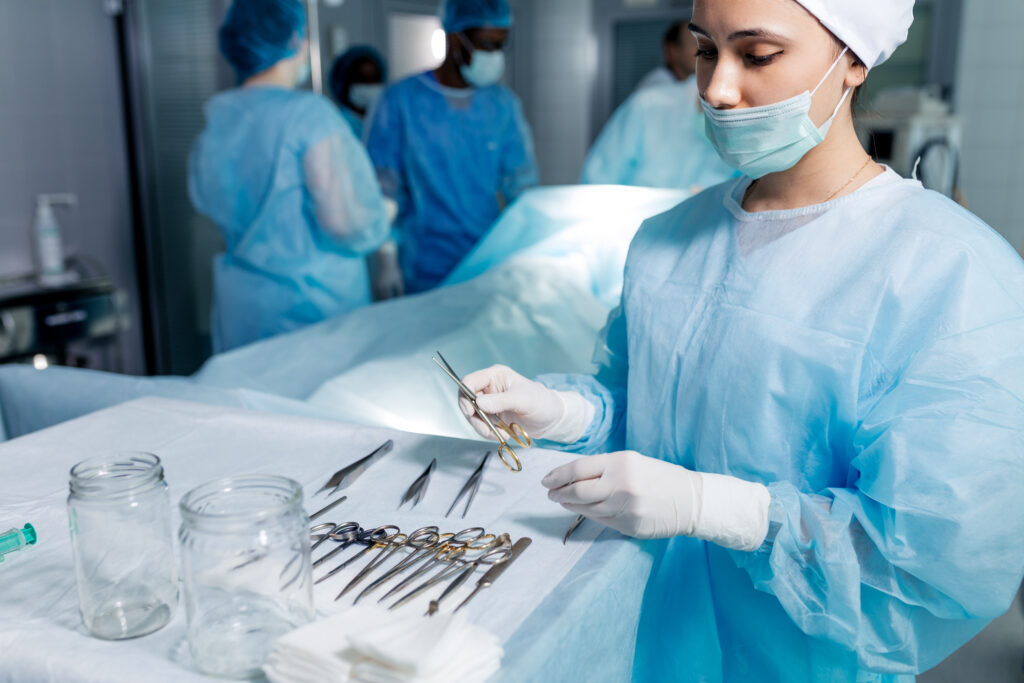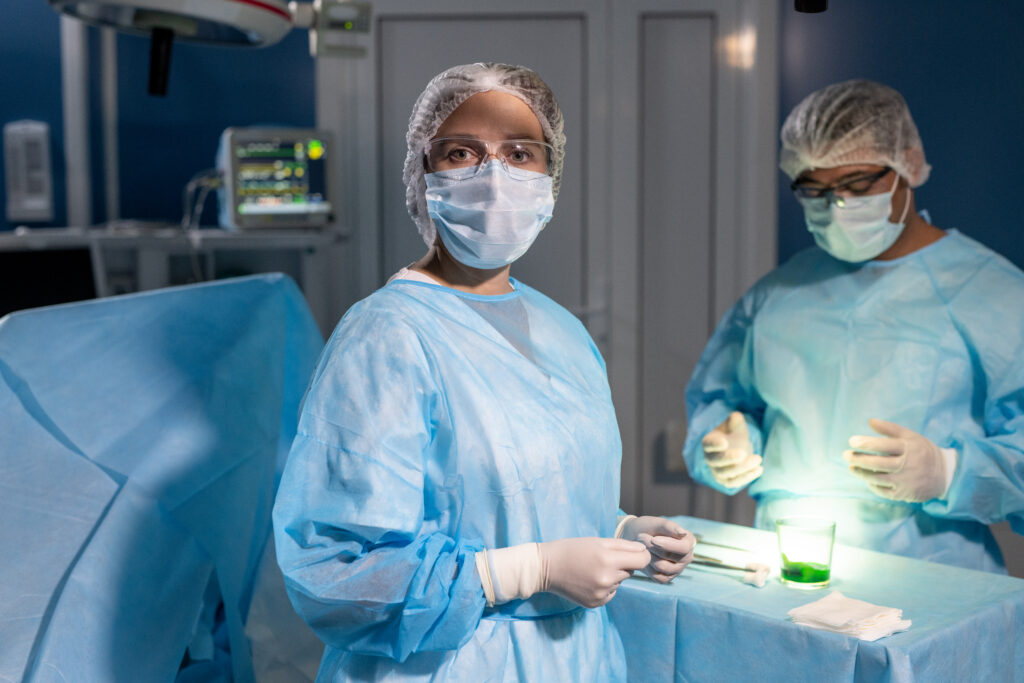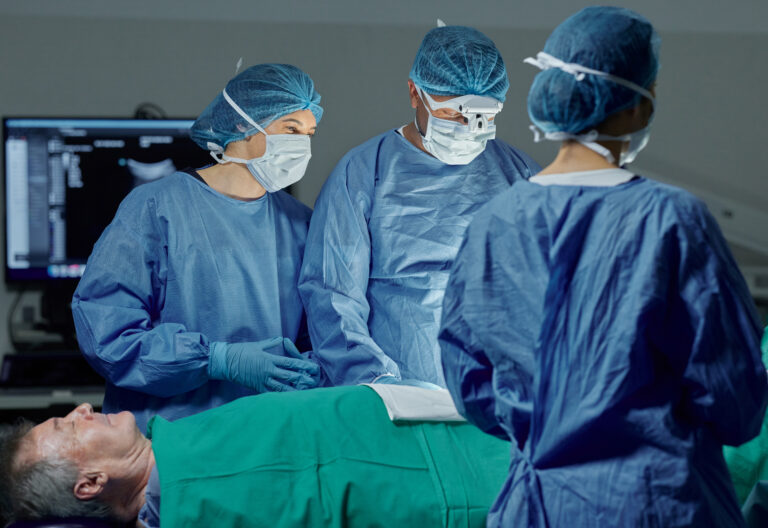If you want to start a career in healthcare and be a part of the surgical team then there’s one more option besides surgical tech, you could become a CVOR tech.
CVOR Techs play a pivotal role in cardiovascular surgeries, from preparing the operating room to assisting during complex procedures, making them indispensable members of the surgical team.
In this article, we’ll discuss about the CVOR techs, their duties, skills, various types, salary, job prospects, and how you can become one.
Moreover, we’ll try to understand the pros and cons of this career, and what difference it actually holds with surgical techs.
So, if all of this intrigues you, stay tuned!

What Is a CVOR Tech?
Cardiovascular Operating Room (CVOR) Technicians are essential members of the surgical team, specializing in procedures involving the heart and vascular system.
They work closely with surgeons, anesthesiologists, and nurses to ensure that cardiovascular surgeries run smoothly and safely.
CVOR Techs are trained professionals who assist in complex surgical procedures like coronary artery bypass grafting, heart valve repair or replacement, and other cardiovascular surgeries.
They are responsible for preparing the operating room, handling surgical instruments, and ensuring that the surgical environment remains sterile.
Their role is crucial for the success of surgeries that often require precision and immediate response to any complications.
Duties of a CVOR Tech
CVOR Techs are integral to the success of cardiovascular surgeries. The duties of a CVOR Tech are varied and critical, requiring a high level of expertise and attention to detail.
Their primary responsibility is to support the surgical team and ensure that the operating room is prepared for cardiovascular procedures.
Their assistance during surgery and post-operative responsibilities ensure that the surgical team can perform their tasks effectively and safely.
Here are their duties:
Preparation of the Operating Room
CVOR Techs prepare the operating room by sterilizing equipment, ensuring that all necessary surgical instruments are available, and setting up the surgical table. They also ensure that the room is stocked with necessary supplies.
Assisting During Surgery
During surgeries, CVOR Techs assist the surgical team by passing instruments, sutures, and other necessary items. They must anticipate the needs of the surgeon and respond quickly to any requests.
Maintaining Sterility
Ensuring a sterile environment is one of the most critical duties of a CVOR Tech. They must adhere to strict protocols to prevent infections, including wearing sterile gowns and gloves, and ensuring that all instruments and surfaces are disinfected.
Monitoring Equipment
CVOR Techs are responsible for monitoring and managing surgical equipment. This includes checking that all devices are functioning properly before the procedure and troubleshooting any issues that arise during surgery.
Post-Surgery Duties
After the surgery, CVOR Techs help with the cleanup and restocking of the operating room. They also ensure that instruments are properly sterilized and stored for future use.
Read:
-> What Does a Surgical Tech Do?
Skills of a CVOR Tech
To excel as a CVOR Tech, individuals need a specific set of skills that go beyond basic surgical assisting. These skills are crucial for maintaining the high standards required in cardiovascular operating rooms.
The skills required to be a successful CVOR Tech are diverse and demanding to thrive in this challenging yet rewarding career.
Here are the skills:
Attention to Detail
CVOR Techs must be meticulous in their preparation and monitoring to ensure that everything is perfect for surgery. Any lapse in attention can lead to serious complications.
Technical Proficiency
A deep understanding of surgical instruments and equipment is essential. CVOR Techs need to know how to operate and troubleshoot various devices used in cardiovascular procedures.
Communication Skills
Effective communication with the surgical team is crucial. CVOR Techs must be able to understand and respond to the needs of surgeons and other team members quickly and accurately.
Stress Management
The operating room is a high-stress environment. CVOR Techs must remain calm and composed, especially during emergencies, to ensure that they can perform their duties effectively.
Physical Stamina
The job often requires long hours of standing and the ability to handle the physical demands of preparing and assisting in surgeries.
Read:
-> Is Surgical Tech School Hard?
Types Of CVOR Techs
In the field of cardiovascular operating room (CVOR) technology, there are various specialized roles that CVOR Technicians can pursue, each focusing on different aspects of cardiovascular surgery and patient care.
These roles require specific training and expertise to meet the unique demands of cardiovascular surgical procedures.
Here are the many types of CVOR techs:
General CVOR Tech
A General CVOR Tech is a versatile professional trained to assist in a wide range of cardiovascular surgeries.
Their duties include preparing the operating room, sterilizing equipment, assisting the surgical team during procedures, and ensuring the sterile field is maintained.
They are knowledgeable about various cardiovascular surgical instruments and techniques, making them essential team members in any cardiovascular surgery.
Pediatric CVOR Tech
Pediatric CVOR Techs specialize in assisting with cardiovascular surgeries on infants, children, and adolescents.
These professionals must have specialized knowledge of pediatric anatomy and physiology, as well as the unique considerations involved in pediatric cardiovascular surgeries.
Their role is critical in ensuring that the surgical environment is suitable for younger patients, and they must be adept at using specialized pediatric surgical instruments.
Adult CVOR Tech
Adult CVOR Techs focus on cardiovascular surgeries for adult patients. These technicians must understand the specific challenges and requirements of adult cardiovascular procedures, including dealing with patients with various underlying health conditions.
Their expertise includes managing adult cardiovascular surgical instruments and assisting the surgical team in procedures such as coronary artery bypass grafting and valve replacement surgeries.
Transplant CVOR Tech
Transplant CVOR Techs are specialized in assisting with heart and other organ transplant surgeries.
This role requires a deep understanding of the complexities involved in transplant procedures, including the preparation and handling of donor organs.
They work closely with the surgical team to ensure that all aspects of the transplant surgery are meticulously planned and executed.
Electrophysiology CVOR Tech
Electrophysiology CVOR Techs specialize in procedures that involve the electrical functions of the heart, such as pacemaker insertions and cardiac ablations.
These technicians must have a thorough understanding of electrophysiology equipment and techniques.
They assist in setting up and operating specialized devices used to diagnose and treat electrical abnormalities in the heart.
CVOR Tech Salary

A Cardiovascular Operating Room (CVOR) Technician earns a competitive salary, reflecting the specialized skills and critical role they play in cardiovascular surgeries.
According to the Bureau of Labor Statistics (BLS) May 2023 data, the average annual salary for CVOR Techs is $70,270, which translates to an hourly wage of $33.79.
The top 10% of CVOR Techs earn an impressive annual salary of $105,140, or about $50.55 per hour. This higher earning potential is typically due to extensive experience, advanced certifications, and working in high-demand locations or prestigious healthcare facilities.
However, the lowest 10% of CVOR Techs earn around $36,620 annually, with an hourly wage of $17.61.
While entry-level CVOR Techs can expect to earn between $36,620 and $44,160 annually. As they gain experience and possibly additional certifications, their earning potential increases.
Overall, a career as a CVOR Tech offers a promising salary range, with opportunities for significant growth based on experience, location, and advanced qualifications.
This competitive compensation highlights the value and demand for skilled professionals in the cardiovascular surgical field.
CVOR Tech Job Outlook
According to the Bureau of Labor Statistics (BLS), employment for cardiovascular technologists and technicians is expected to grow by 4% over the next decade.
This growth is particularly significant for a specialized role within the broader category of surgical technologists.
Several factors contribute to this promising job outlook. The aging population and continuous advancements in medical technology are driving an increase in cardiovascular surgeries.
Consequently, the demand for skilled Cardiovascular Operating Room (CVOR) Technicians will rise, ensuring a bright and secure future for professionals in this field.
How To Become A CVOR Tech?
Becoming a Cardiovascular Operating Room (CVOR) Technician is a commendable career choice for those passionate about cardiovascular surgery. This specialized role requires specific education, training, and dedication.
Here’s a step-by-step guide to help you on your journey to becoming a CVOR Tech:
Step 1 –> Obtain a High School Diploma or Equivalent
Your journey begins with a high school diploma or equivalent. This is the foundational educational requirement for entering most surgical tech programs.
Step 2 –> Enroll in a Surgical Tech Program
Next, you need to enroll in a surgical tech program. Technical schools, community colleges, vocational institutions, and online schools offer these programs.
Online Surgical Tech programs offer unparalleled flexibility and convenience, making them an ideal choice for many students.
One such program is – Preppy’s Surgical Tech Training Program. With this program, you get –
-> Accredited, 100% online, and self-paced learning experience
-> Externship opportunity at a local healthcare facility
-> TS-C and NCST Certification Exam Ready
-> Affordable pricing at just $1599
-> Job-ready within 4 months, and much more.
So, if you want to become job-ready as a surgical tech faster at an affordable price then enroll in Preppy’s Surgical Tech Training Program.
Step 3 –> Get Certified as a Surgical Tech
After completing the program, you can sit for the Tech in Surgery – Certified (TS-C) exam administered by NCCT or the Nationally Certified Surgical Technologist (NCST) exam offered by AAH.
Also Read:
-> Surgical Tech Certification Online
-> Can You Be A Surgical Tech Without Certification?
Step 4 –> Gain Experience as a Surgical Tech
Start your career as a surgical tech to acquire valuable hands-on experience in various surgical specialties, including cardiovascular surgery.
Working in a general operating room will help you understand surgical procedures and the importance of maintaining a sterile field.
Step 5 –> Specialize in Cardiovascular Surgery
After gaining experience, you can specialize in cardiovascular surgery. Many healthcare facilities offer on-the-job training and mentoring programs for CVOR Techs, providing the specialized training needed to excel in the cardiovascular operating room.
Step 6 –> Gain Cardiovascular-Specific Certifications
While not mandatory, obtaining certifications specific to cardiovascular surgery can enhance your credentials.
The NBSTSA offers the Certified Surgical Technologist-CVOR (CST-CVOR) certification for those working in cardiovascular operating rooms.
Additionally, the American Heart Association (AHA) provides certifications such as BLS (Basic Life Support) and CPR (Cardiopulmonary Resuscitation) training, which can give you a competitive edge.
Step 7 –> Seek Employment Opportunities
Once you’ve completed your education, training, and certification, you can start looking for jobs as a CVOR Tech.
Stay updated with the latest advancements in cardiovascular surgery by participating in seminars, workshops, and training programs. Career advancement opportunities may include roles such as lead CVOR Tech, educator, or supervisor.
Also Read:
-> How To Become A Surgical Tech?
-> Pros And Cons Of Being A Surgical Tech
-> How To Become A Certified Surgical Tech?
-> How Long Does It Take To Become A Surgical Tech?
Is CVOR Tech A Good Career? Pros and Cons
Choosing a career as a Cardiovascular Operating Room (CVOR) Technician can be a significant decision.
This role involves working in a high-stakes environment, assisting surgeons during cardiovascular procedures, and ensuring the success of critical surgeries.
To determine if it’s the right career path for you, it’s essential to weigh the pros and cons.
Pros of Being a CVOR Tech
High Demand and Job Stability
The demand for CVOR Techs is rising due to an aging population and the increasing prevalence of cardiovascular diseases. This growth ensures job stability and numerous opportunities for employment.
Healthcare is a sector with consistent demand, and specialized roles like CVOR Techs are less likely to face job cuts compared to other industries.
Attractive Compensation
CVOR Techs typically earn competitive salaries, often higher than other surgical tech positions due to the specialized nature of their work.
According to the Bureau of Labor Statistics, the median annual wage for surgical technologists, including CVOR Techs, was around $49,710 in 2020, with the potential for higher earnings depending on experience and location.
Read More:
-> Surgical Tech Job Description
Rewarding Work
CVOR Techs play a crucial part in saving lives and improving patient outcomes. The sense of fulfillment from contributing to successful surgeries can be immensely rewarding.
Additionally, working in the operating room is fast-paced and constantly evolving, offering a stimulating work environment.
Opportunities for Advancement
With experience and additional certifications, CVOR Techs can advance to roles such as surgical assistants, or even move into administrative positions within the healthcare sector.
Additionally, the medical field constantly advances, offering CVOR Techs opportunities for continuous education and skill enhancement.
Cons of Being a CVOR Tech
Stressful Work Environment
The operating room is a high-pressure environment where precision and quick decision-making are critical. This can lead to significant stress, especially during emergency surgeries.
Plus, CVOR Techs often work long, irregular hours, including nights, weekends, and holidays. On-call shifts can also disrupt personal life and lead to burnout.
Physically Strenuous
The job requires long periods of standing, moving heavy equipment, and assisting in physically demanding procedures, which can lead to physical strain and fatigue.
Exposure to Risks
Working in a surgical environment exposes CVOR Techs to potential risks, including exposure to infectious diseases and handling sharp instruments.
Emotional Strain
Witnessing critical surgeries and dealing with patient outcomes can be emotionally taxing. It requires a high level of emotional resilience to handle the stress and potential emotional toll.
Extensive Training and Certification Requirements
Becoming a CVOR Tech requires completing a specialized surgical tech program and obtaining certification. This involves a significant time and financial investment.
Plus, to maintain certification, CVOR Techs must engage in ongoing education and training, which can be time-consuming and demanding.
Ultimately, weighing these pros and cons can help you determine if this career aligns with your personal and professional goals.
If you have a passion for healthcare, the ability to handle high-pressure situations, and a commitment to continuous learning, becoming a CVOR Tech can be a highly rewarding career choice.
Difference Between CVOR Tech and Surgical Tech

CVOR Techs and Surgical Techs, are both vital to the surgical team, ensuring successful operations and patient safety.
The key differences lie in their specialization, training, and specific roles within the operating room.
CVOR Techs focus exclusively on cardiovascular procedures, requiring specialized training and expertise, while Surgical Techs have a broader scope, assisting in a wide variety of surgeries across different medical fields.
Your career choice between the two should align with your interest in general surgery versus a specialized focus on cardiovascular health.
Let’s discuss the key differences:
Specialization and Focus
CVOR Techs specializes in cardiovascular surgeries, which involve procedures on the heart and blood vessels. Their role is highly specialized, requiring an in-depth understanding of cardiovascular surgical techniques, equipment, and specific protocols related to heart surgeries.
In contrast, Surgical Techs assist in a broad range of surgical procedures across various medical fields, such as orthopedics, neurology, and general surgery. They support surgeons, nurses, and other medical staff in all types of surgeries, providing a versatile role in the operating room.
Duties and Responsibilities
The duties of a CVOR Tech revolve around preparing the operating room specifically for cardiovascular procedures. They assist with complex cardiovascular surgeries, manage specialized cardiovascular equipment, and work closely with cardiovascular surgeons, anesthesiologists, and other specialized staff.
On the other hand, Surgical Techs prepare the operating room for a wide variety of surgeries, sterilize instruments, ensure the surgical environment is aseptic, hand instruments to surgeons during procedures, and assist in closing wounds and applying dressings.
Training and Certification
CVOR Techs require specialized training in cardiovascular procedures and often need additional certification beyond standard surgical tech credentials.
This training focuses on cardiovascular surgery and requires continuous education on advancements in cardiovascular surgical techniques.
Surgical Techs complete a surgical technology program, which can be a certificate, diploma, or associate degree. A common certification for Surgical Techs is the TS-C credential by the NCCT.
Their training includes a broad range of surgical procedures and general operating room protocols.
Work Environment
CVOR Techs typically work in specialized cardiovascular units within hospitals or dedicated cardiovascular surgical centers, often involved in high-stakes, high-pressure surgical procedures.
In contrast, Surgical Techs work in a variety of settings, including hospitals, outpatient surgical centers, and clinics. They are involved in a wider range of surgeries, providing versatility in their work environment.
Skills and Expertise
CVOR Techs possess advanced knowledge of cardiovascular anatomy and physiology, proficiency in handling cardiovascular surgical instruments and technology, and the ability to remain calm and precise in high-pressure cardiovascular procedures.
Surgical Techs, however, have a broad knowledge of surgical procedures across different specialties, skillfully maintain a sterile environment, manage surgical instruments, and adapt to various types of surgeries, quickly learning new techniques.
You May Also Like:
-> Surgical Tech Certificate Program
-> Online Surgical Tech Programs
-> Surgical Tech Training Programs
Conclusion
We hope this article enlightens you about CVOR techs, whether it is a good career, and what difference it holds with a surgical tech.
CVOR Techs play a critical role in cardiovascular surgeries, and their specialization allows them to provide targeted assistance in various types of procedures.
Whether focusing on general cardiovascular surgeries, pediatric cases, transplants, or electrophysiology, CVOR Techs bring essential skills and expertise to the operating room.
Each type of CVOR Tech is vital for ensuring successful surgical outcomes and advancing the field of cardiovascular surgery.
Ultimately, if you want to start your career as a surgical tech faster, at an affordable price, with an externship and certification readiness, then enroll in Preppy’s Surgical Tech Training Program.
Related:
-> Scrub Nurse Vs Surgical Tech
-> 6-Week Surgical Tech Program
-> Surgical Tech Vs Surgical Assistant





